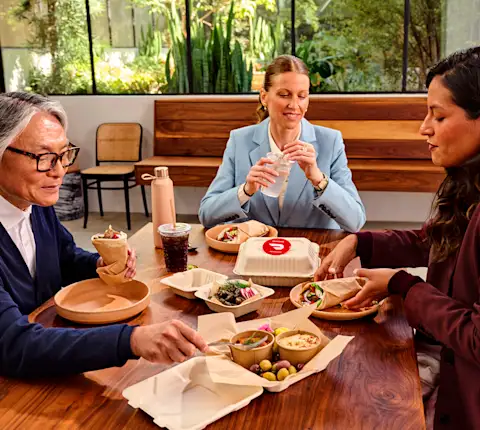Dietary diversity brings a rich and vibrant element to the workplace, showcasing the unique backgrounds, preferences, and traditions of your team. While some may need to navigate dietary restrictions, food allergies, or cultural and ethical preferences, this diversity is an opportunity to create a more inclusive environment. By being conscious and conscientious when it comes to employee’s diets and food sensitivities, employers can foster a greater sense of belonging and ensure that employees feel included in every team event or meal.

The impact of diversity and inclusion in the workplace
A workplace that champions diversity, equity and inclusion (DEI) is good for your people and business growth. Diverse, inclusive, equitable workplaces are more attractive to top talent, and they're better at retaining talent thanks to reduced rates of employee turnover and greater job satisfaction. These workplaces also hold the potential to be more innovative, as having different perspectives can be valuable for problem-solving.
All of this leads to improved performance. In one analysis, 75% of companies with diverse and inclusive cultures surpassed their financial targets. Another study examined this same phenomenon and found that highly inclusive organizations were exceeding those targets.
Employee meal programs and workplace events that support diverse cultures, lifestyles, and abilities can enhance productivity, collaboration, engagement, and morale. That’s why it’s important to be aware of the most common dietary restrictions when planning workplace events, because there's a reasonable chance they could impact some of your team members.
Navigating dietary restrictions in the workplace
When planning workplace events, understanding and accommodating employees' dietary needs is key to creating an inclusive experience. Here’s a look at the most common dietary restrictions and allergies.
Allergies
Some of the most common allergens include legumes like peanuts and soy, and tree nuts such as almonds, cashews, or hazelnuts. Wheat is also a relatively common allergen; gluten — a protein found in wheat — is present in many prepared foods.
There are also different types of sensitives to milk: lactose intolerance and allergies to proteins in milk, such as casein or whey. There has also been an increasing number of people with sesame allergies.
Another common allergen to be aware of for allergy friendly meal delivery is egg, though some people do outgrow this allergy as they get older. Allergies to finned fish and shellfish are quite common, and often develop in adulthood.
Diets
Common diets include vegetarianism and veganism, in which people limit or completely avoid consumption of animal products.
There are also diets focused on health goals such as weight loss — ketogenic or "keto" diets are, broadly speaking, based on gaining daily calories while avoiding carbs. The popular paleo diet is similar in prioritizing natural protein sources, but incorporates naturally occurring sugars and starches.
People with certain conditions may also need to restrict their diets. For instance, people with type I and type II diabetes usually need to limit themselves to items with a low glycemic index to prevent their blood sugar from spiking, and steering clear of refined grains and processed sugars.
Customs
Certain religious or cultural systems have precepts and principles related to food. These create common dietary restrictions that are central to personal identity. Examples include halal dietary restrictions for Muslims, and kosher meal delivery requirements for observant Jews.

Inclusive meal planning made easy with DoorDash for Business
By offering a diverse range of meals, snacks, and beverages that consider a variety of dietary needs, you can ensure there's something for everyone when ordering office meals or hiring caterers for events. For example, vegan meal delivery or vegetarian diet meal delivery may also be paleo- and diabetes-friendly, as well as halal and gluten-free.
But by far the easiest and most efficient way to ensure your workplace meals are diverse, inclusive and safe, is to let employees choose their own food. This is a huge stress reliever for people with dietary restrictions, as well as for admins. And that's where DoorDash for Business can help through a wide range of products and solutions.
With a nationwide network consisting of more than 500,000 merchants, DoorDash for Business provides the accessibility, convenience, and choice your workforce needs. With a centralized platform for group ordering, simplified billing, and the ability to extend employee meal credits or one-time vouchers to team members, it takes the burden off team leaders and HR managers.
A diverse, inclusive, and equitable workplace is one where everyone feels acknowledged, accommodated, and safe. And for people with dietary restrictions, there are few things more comforting than the ability to control what they order and where they order from.
Learn more about how to feed your team while respecting all dietary restrictions, and download our Inclusive Meals Checklist for easy reference.




